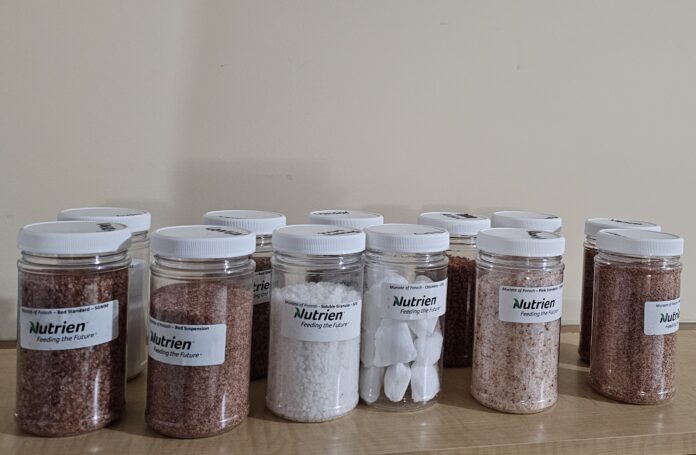Potash, primarily known for its use in fertilizers, contains potassium, which can be utilized in various applications, including electronics. While potash itself is not directly used in phone production, the potassium it contains can be processed and utilized in several ways relevant to the manufacturing of smartphones, bulletproof vests and vehicles: Let us examine first the use in smartphone manufacturing.
Potassium Hydroxide (KOH):
- Usage: Potassium hydroxide is used in the production of alkaline batteries, which are sometimes used in electronic devices, though less common in smartphones compared to lithium-ion batteries.
Specialized Glass:
- Usage: Potassium is a key component in the production of certain types of strengthened glass, such as aluminosilicate glass used in smartphone screens. This glass is chemically treated with potassium to improve its durability and resistance to scratches and impacts. For example, Gorilla Glass, widely used in smartphones, is manufactured using a potassium-ion exchange process to enhance its strength.
Electrolytes:
- Usage: Potassium compounds can be used in the development of electrolytes for various types of batteries. While lithium-ion batteries are predominant in smartphones, research into alternative battery chemistries sometimes involves potassium compounds.
Chemical Etching:
- Usage: Potassium hydroxide is used in the etching process of semiconductor manufacturing. This process helps in creating the intricate patterns required on semiconductor wafers, which are fundamental components of a smartphone’s integrated circuits.
In summary, while potash itself is not directly used in phone production, the potassium derived from potash plays a significant role in producing the durable glass used for smartphone screens, as well as in certain chemical processes in semiconductor manufacturing and potential future battery technologies.
How Potash Can Be Useful in Bulletproof Vests
Potash, containing potassium, is primarily known for its agricultural applications. However, potassium derived from potash can be processed and utilized in various ways that are relevant to the manufacturing of bulletproof vests. Here’s how potassium can contribute to the effectiveness of bulletproof vests:
Reinforced Fibers:
- Usage: Potassium compounds can be used in the production of high-strength fibers such as Kevlar. Kevlar fibers are treated and reinforced using various chemical processes, some of which involve potassium compounds, to enhance their strength and durability. These fibers are woven into fabrics that form the basis of bulletproof vests, providing resistance to ballistic impacts.
Ceramic Plate Reinforcement:
- Usage: Potassium is used in the production of certain ceramics that can be incorporated into bulletproof vests. Ceramic plates are often added to the fabric layers of vests to provide additional protection against high-caliber rounds. Potassium can improve the toughness and thermal stability of these ceramics, making them more effective at stopping bullets.
Polymer Composites:
- Usage: Potassium compounds are involved in the synthesis of advanced polymers used in composite materials. These composite materials are lightweight yet strong, providing added protection without significantly increasing the weight of the vest. The inclusion of potassium in the polymer matrix can enhance the mechanical properties of these composites.
Specialized Coatings:
- Usage: Potassium hydroxide (KOH) and other potassium compounds can be used in the formulation of specialized coatings for bulletproof vests. These coatings can improve the abrasion resistance, chemical resistance, and overall durability of the vest materials, ensuring long-lasting protection.
In summary, while potash itself is not directly used in the production of bulletproof vests, the potassium derived from it plays a crucial role in enhancing the materials used in vests. From reinforced fibers and ceramic plates to advanced polymers and specialized coatings, potassium contributes to the overall effectiveness and durability of bulletproof vests, providing critical protection in ballistic situations.
How Potash Can Be Useful in Bulletproof Vehicles
Potash, primarily known for its use in agriculture, contains potassium, which can be processed and utilized in various applications, including the production of materials used in bulletproof vehicles. Here’s how potassium derived from potash can be useful in this context:
Specialized Glass:
- Usage: Potassium is a key component in the production of certain types of strengthened glass, such as aluminosilicate glass. This glass is chemically treated with potassium to improve its durability and resistance to impact, making it suitable for bulletproof windows in vehicles. The potassium-ion exchange process enhances the glass’s strength and ability to absorb and dissipate energy from ballistic impacts.
Reinforced Composites:
- Usage: Potassium compounds can be used in the development of advanced composites that are lighter and stronger. These composites can be incorporated into vehicle armor, enhancing the vehicle’s ability to withstand ballistic threats while minimizing weight, which is crucial for maintaining vehicle performance and mobility.
Ceramic Armor:
- Usage: Potassium can play a role in the production of certain ceramics used in armor plating. Ceramic armor is effective at stopping bullets and other projectiles by shattering them on impact, and the inclusion of potassium in the ceramic matrix can improve the material’s properties, such as toughness and thermal stability.
Chemical Processes:
- Usage: Potassium hydroxide (KOH) is used in various chemical processes that can contribute to the production of materials used in bulletproofing. For example, it can be used in the synthesis of polymers and other materials that are part of composite armor systems.
In summary, while potash itself is not directly used in the production of bulletproof vehicles, the potassium derived from it plays a significant role in creating durable, impact-resistant materials like specialized glass, reinforced composites, and ceramics. These materials are essential for enhancing the protective capabilities of bulletproof vehicles.









